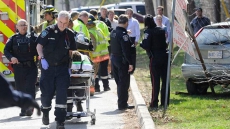TORONTO — A motion by the Ontario government to force elderly and severely mentally ill plaintiffs to submit to last-minute pre-trial questioning is little more than an unwarranted and heartless delay tactic, a Superior Court justice has ruled.
In a stinging indictment of the province's litigation strategy, Justice Ed Morgan slammed the government for its "ill-conceived" effort. The government, he said, was perverting process rules designed to facilitate getting parties to a fair trial.
"The rules ought not be recited by rote and implemented in unflinchingly literalist fashion," Morgan said. "A party ought not use the rules to compel a person suffering serious mental illness to reattend on multiple occasions to be put through an insufferable and predictably unproductive ordeal just because, on a literal reading, the rules might allow (it)."
The government's motion comes ahead of a civil trial scheduled in April involving three dozen plaintiffs. They allege they were victims of "scientifically meritless, degrading and inhumane experimentation and torture" under the guise of psychiatric treatment at the Oak Ridge Division of the Penetanguishene Mental Hospital from 1963 to 1985.
Among other things, they allege they were forced to take experimental drugs while having to live naked in close quarters in a small, unfurnished space for months on end.
In 2000, they sued the province, alleging they had suffered severe psychiatric harm that essentially ruined their lives. The substance of their allegations were finally set to be tested during a six-week trial slated to start at the end of April.
Court records show the plaintiffs have over the years all submitted to questioning by government lawyers, some more than once. The last such examination happened earlier this year. In addition, they have produced extensive medical and criminal records.
Earlier this week, the government brought the motion to force the plaintiffs to answer still more questions. The plaintiffs maintained they had already done everything possible to provide the information sought.
In rejecting the government's request, Morgan cited one example in which the province wanted to re-examine a man found not criminally responsible for two killings in 1971 and 1990 despite already having access to his psychiatric file.
Court records show the government wanted him to tell them what he was thinking when he murdered the two victims. His lawyers refused, saying it would be severely detrimental to force him to relive the mental health crisis he was in when he killed.
"Having been found to have committed the violent acts while in such a severe disabled state that he could not perceive reality and cannot be held criminally responsible, the Crown nevertheless thought it helpful to ask him what was on his mind when he dissociated from reality," Morgan said. "The Crown's motion has not been well thought through. I do not know whether this was a strategy or simply a lack of clear thinking."
Other Crown requests Morgan panned were for records of one plaintiff's criminal trials, including the exhibits and pre-sentence reports which the government could have obtained on its own, and for a woman's diaries, including one from 2012.
"I asked Crown counsel what the relevance of this diary is, since it was made some 45 years after the events in issue here," Morgan said. "Her response was that one never knows what might be in a diary. Needless to say, Crown counsel's response to my question is the very embodiment of a 'fishing expedition.'"
Morgan said the case was finally ready, after almost two decades, to head to trial. The government's attempt to now ask further questions at serious detriment to a plaintiff who would be unable to answer made little sense, he said.
"Why they thought they should try is beyond me," the judge said.
Morgan also ordered the government to pay $30,000 to the plaintiffs for the costs of the failed motion.





